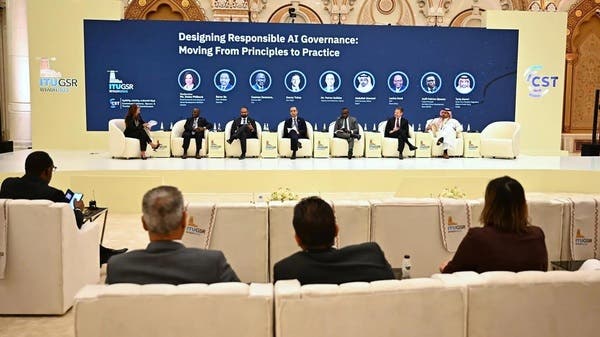International experts and executives have affirmed that governance of artificial intelligence technologies is a fundamental pillar for the global future, emphasizing the need to translate theoretical principles into practical practices that ensure inclusivity, fairness, and foster responsible innovation.
This was stated during a panel held today as part of the exhibition accompanying the Global Symposium for Regulators “GSR25”, titled “Responsible AI Governance: Turning Principles into Practice.”
The session discussed key challenges related to AI regulation, including risk level classification, intellectual property rights, copyrights, and quality assurance pathways in digital environments.
Cosmas Zavazava, Director of the Telecommunication Development Bureau (BDT) at the International Telecommunication Union, pointed out that AI is inherently cross-border and will impact both developed and developing countries alike.
He stressed the necessity of establishing mechanisms and coordinated efforts among countries to ensure fair legislation and balance between innovation and regulation.
Meanwhile, Boukar Ba, CEO of SAMENA, explained that internet sustainability is closely linked to AI governance, emphasizing that regulations should be based on transparency and trust principles to ensure all communities benefit from digital transformation.
Daniel Toby, Head of AI Practices and Data Analytics at DLA PIPER, noted the difficulty of subjecting thousands of AI applications to unified regulations, confirming that some high-risk models are still under development, and that those seeking common regulatory frameworks may not find a comprehensive list, reflecting the magnitude of the challenge.
Petros Galides, Executive Technology Expert, stressed that AI remains human-centered, which helps reduce risks when laws are applied under basic conditions such as privacy protection and enhancing digital security to ensure sustainable development.
Abdullah Khormi, CEO of Business Sector at Salam, addressed the issue of connectivity and unified networks, stressing that AI governance requires establishing golden rules that preserve privacy, build fair infrastructures, and formulate policies based on transparency between companies and customers.
For his part, Fabrice Degousso, Senior Expert at BOAD, explained that AI represents a unique opportunity for Africa to bridge infrastructure gaps and achieve qualitative leaps in health and education, noting that rapid adoption of this technology requires broad partnerships and cooperation to ensure sustainable benefits.













Recommended for you
Exhibition City Completes About 80% of Preparations for the Damascus International Fair Launch
Talib Al-Rifai Chronicles Kuwaiti Art Heritage in "Doukhi.. Tasaseem Al-Saba"
Unified Admission Applications Start Tuesday with 640 Students to be Accepted in Medicine
Egypt Post: We Have Over 10 Million Customers in Savings Accounts and Offer Daily, Monthly, and Annual Returns
His Highness Sheikh Isa bin Salman bin Hamad Al Khalifa Receives the United States Ambassador to the Kingdom of Bahrain
Al-Jaghbeer: The Industrial Sector Leads Economic Growth